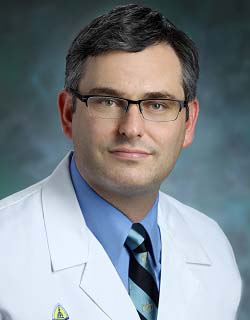Caring for Your Voice with Dr. Lee Akst and Marisa Sanders
May 23, 2018
Are you taking care of your voice?
What do teachers, bartenders, attorneys, singers, and salespeople have in common? Because of the vocal demands of their jobs, they’re all at increased risk of developing a voice disorder. Dr. Lee Akst, Director of the Johns Hopkins Voice Center at GBMC and Marisa Sanders, Senior Speech Sathologist at the Center, shared what people can do to protect their voices, what types of conditions can affect your vocal cords, and how an otolaryngologist or speech pathologist can help your voice get back to normal.
“The key is to protect your voice,” explained Dr. Akst. “Drink enough water to stay hydrated and lubricate the vocal cords. Limit caffeine, which is dehydrating. Try not to yell and pay attention to how your voice feels and sounds. If you’re having trouble with your voice, don’t try to push past it. That’s how you can turn a short term problem into a longer term one.” Adds Marisa, “If you’re a teacher, for example, use amplification in the class room so you decrease the stress on your vocal cords and rest your voice whenever you can.”
Dr. Akst also outlined the types of problems that can affect your vocal cords—from nodules and polyps to vocal cord paralysis and cancer—and how he and the team of specialists at the Voice Center diagnose voice disorders. He stressed that most voice disorders are not only treatable, many are preventable.
“If a problem with your voice is disrupting your quality of life, see an otolaryngologist,” he said. “You know your voice best. If you feel like it isn’t working as it should, there’s no reason you should suffer.”



